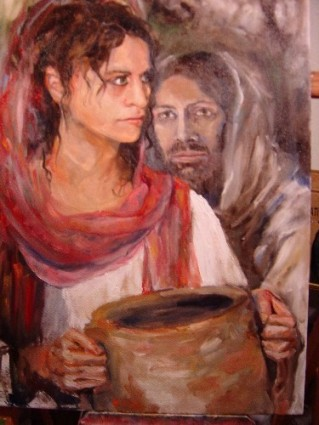Passion (Palm) Sunday A
Readings: Entrance into Jerusalem: Matthew 21:1‑11
Isaiah 50:4‑7 Philippians 2:6‑11 Matthew 26:14‑27:66
Although the liturgy for Passion Sunday seems to move abruptly from Jesus' joyful entrance into Jerusalem to his passion and death, there is an inextricable connection between the two events. By entering Jerusalem as the peaceful Messiah prophesized by Zechariah, Jesus precipitates the final conflict with the leaders which will lead to his death and resurrection. With a deliberate sense of his Messianic mission, Jesus instructs two disciples to prepare for his entrance in fulfillment of Zechariah's prophecy: "Tell the daughter of Zion,/ your king comes to you without display/ astride an ass, astride a colt,/ the foal of a beast of burden." Rather than entering upon a horse, the mount of the triumphant warrior Messiah expected by many, Jesus comes to Jerusalem "without display" as a meek and peaceful king. And already there is a foreboding of division over him. Matthew notes, "As he entered Jerusalem the whole city was stirred to its depths, demanding, `Who is this?'" At this point "the crowd" is supportive and answers, "This is the prophet Jesus from Nazareth in Galilee." But, in the course of the passion, they will be convinced by the chief priests and elders to ask for the release of Barabbas and "have Jesus put to death."
The Isaiah reading continues the theme of commitment to God's mission. In an autobiographical report, the prophet Second Isaiah speaks of God’s mysterious servant’s tireless commitment to speaking a rousing word to the "weary" exiles who think that their Lord is powerless to save them from their Babylonian captors. Because of his confidence that the Lord is his help, the servant, like Jesus in Gethsemane, has the courage not to turn back from his wearisome task, even though it involves suffering and rejection.
In the Philippians hymn Paul exhorts the Philippian Christians to follow the self‑emptying love of Christ, who did not grasp at being God-like. He, like the suffering servant in Second Isaiah (Isaiah 53), took the form of a slave and emptied himself by becoming fully human, even to the point of obediently accepting the degradation of death on a cross. God responded to this act of self‑emptying love by exalting Jesus and bestowing on him lordship over the cosmos, so that at his name all beings in the universe might acknowledge him as Lord and Messiah.
Matthew's passion story emphasizes Jesus' voluntary acceptance of his death as a meek and peaceful Messiah in fulfillment of Old Testament prophecy and in faith in his eventual resurrection. I will concentrate on the opening Garden scene where Jesus embraces his mission. Even as they walk to the Mount of Olives, Jesus is preparing his disciples for what must happen.
“Tonight your faith in me will be shaken, for Scripture
has it: `I will strike the shepherd and the sheep of
the flock will be dispersed.' But after I am raised
up, I will go to Galilee ahead of you."
In Gethsemane Jesus, nearly overwhelmed with "sorrow and distress," tells Peter and Zebedee's two sons, "My heart is nearly broken with sorrow. Remain here and stay awake with me." Although his disciples fail him by falling asleep, Jesus with great difficulty gradually conforms himself to his Father's will. His first prayer asks, "My Father, if it is possible, let this cup pass me by. Still, let it be as you would have it, not as I." By his second prayer, Jesus has come to accept his Father's will: "My Father, if this cannot pass me by without my drinking it, your will be done!" When he finishes praying the third time, Jesus is fully prepared to embrace his mission. He tells the sleeping disciples, "The hour is on us when the Son of Man is to be handed over to the power of evil men. Get up! Let us be on our way! See, my betrayer is here."
In the arrest scene Jesus is clearly in control and deliberately embraces the plan his Father has for him as the peaceful and suffering Messiah. When "one of those who accompanied" him attempts to prevent his arrest by slashing at the high priest's servant, Jesus tells him to put back his sword where it belongs and warns him that those who use the sword will die by it. He concludes by saying, "Do you not suppose I can call on my Father to provide at a moment's notice more than twelve legions of angels? But then how would the Scriptures be fulfilled which say it must happen this way?" Finally, Jesus' words to the crowd stress that he is following the path of the peaceful Messiah set out for him in the Scriptures. "Am I a brigand, that you have come armed with swords and clubs to arrest me? From day to day I sat teaching in the temple precincts, yet you never arrested me. Nonetheless, all this has happened in fulfillment of the writings of the prophets."




